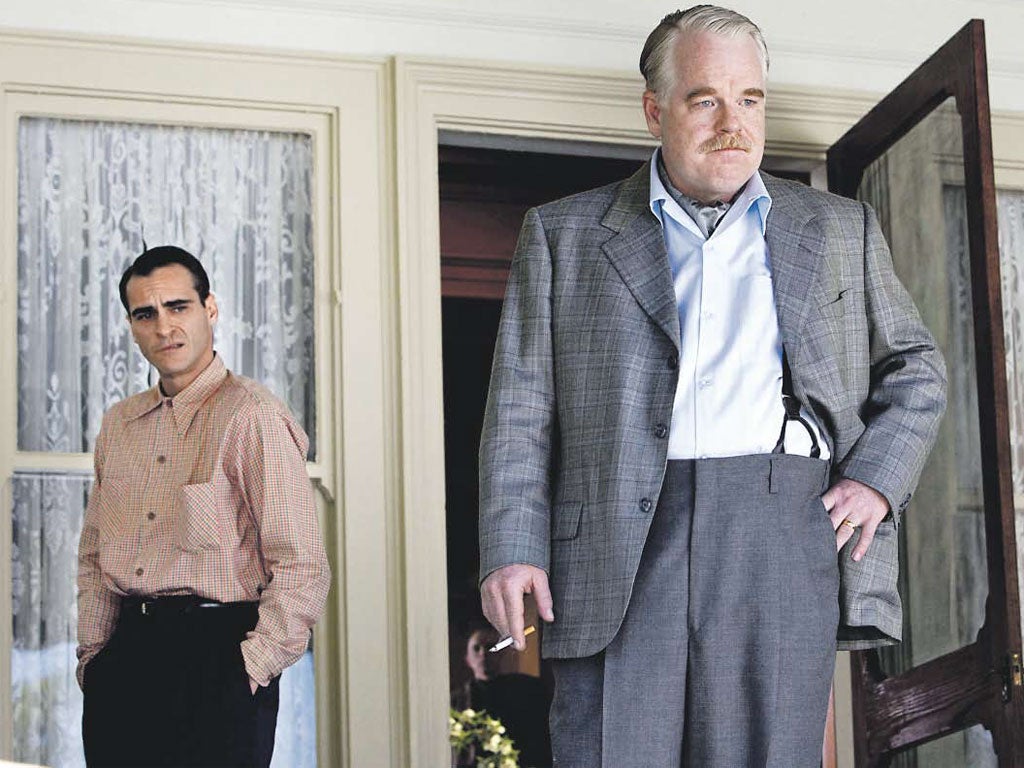The Master, Venice Film Festival
Bizarre buddies whose lives expose the tensions of the American Dream

Your support helps us to tell the story
From reproductive rights to climate change to Big Tech, The Independent is on the ground when the story is developing. Whether it's investigating the financials of Elon Musk's pro-Trump PAC or producing our latest documentary, 'The A Word', which shines a light on the American women fighting for reproductive rights, we know how important it is to parse out the facts from the messaging.
At such a critical moment in US history, we need reporters on the ground. Your donation allows us to keep sending journalists to speak to both sides of the story.
The Independent is trusted by Americans across the entire political spectrum. And unlike many other quality news outlets, we choose not to lock Americans out of our reporting and analysis with paywalls. We believe quality journalism should be available to everyone, paid for by those who can afford it.
Your support makes all the difference.Paul Thomas Anderson's The Master is a rich and very strange affair that re-creates early 1950s America in an utterly distinctive way. The powerhouse performances from Joaquin Phoenix and Philip Seymour Hoffman galvanize a film that is deliberately very oblique in its storytelling.
First seen frolicking on the beach next to huge sand statue of a naked woman, Phoenix's character Freddie Sutton is a US navy veteran, traumatised by what he has seen in the Second World War and with sex at the top of his mind as he returns to civilian life. Phoenix plays the character in restless, prowling fashion, accentuating his wolf-like qualities. Freddie is a drunkard and delinquent who doesn't know what to do with his life. In the scenes in which he tries disastrously to build a career as a photographer, he can't help but rekindle memories of Dana Andrews' equally combustible and tormented returning serviceman in William Wyler's The Best Years of Our Lives.
By coincidence, Freddie is thrown into the orbit of Lancaster Dodd (Seymour Hoffman), a mountebank who's busy starting up a new cult. Paul Thomas Anderson has acknowledged that Lancaster and his movement were partly inspired by L Ron Hubbard and the early days of Dianetics. However, as played by Seymour Hoffman, all bulk and bonhomie, Lancaster also has more than a passing resemblance to Burt Lancaster's Elmer Gantry.
If The Master is intended as a satire on or exposé of Scientology, it is not a very hard-hitting one. Seymour Hoffman's Lancaster Dodd is an amiable if very volatile figure with his own hedonistic appetite for alcohol and for carousing naked with his followers. He is surrounded by women, most notably his wife (Amy Adams) who are as opinionated and strong willed as he is. He seems easy going but has a ferocious temper. He can also be a very strict taskmaster. In one of the film's most jarring sequences, he makes Freddie walk back and forth across a room time after time, touching the wall and turning back to touch the window. This is part of his painstaking attempt to strain the anger out of his hot-headed follower.
Most of The Master is devoted to chronicling the bizarre relationship between the two men. They're not friends in any conventional sense but there's an intense bond between them. Freddie deals very aggressively with anyone who expresses scepticism about Dodd's new religion, which the leader acknowledges at one stage he is making up as he goes along.
One of the glories of the film, shot in widescreen 70mm and in rich, dark colours, is its recreation of post-war US. It's a time of opportunity but the demobbed armed forces are still bearing the scars of war. Jonny Greenwood's discordant jazz-based soundtrack and Phoenix's nervous, angry performance make it very clear that there is anxiety aplenty alongside the optimism. As in his 2007 epic There Will be Blood, Anderson excels at exposing the simmering tensions behind the American dream. Here, he also offers a wonderfully perverse twist on the conventional buddy movie.
Join our commenting forum
Join thought-provoking conversations, follow other Independent readers and see their replies
Comments